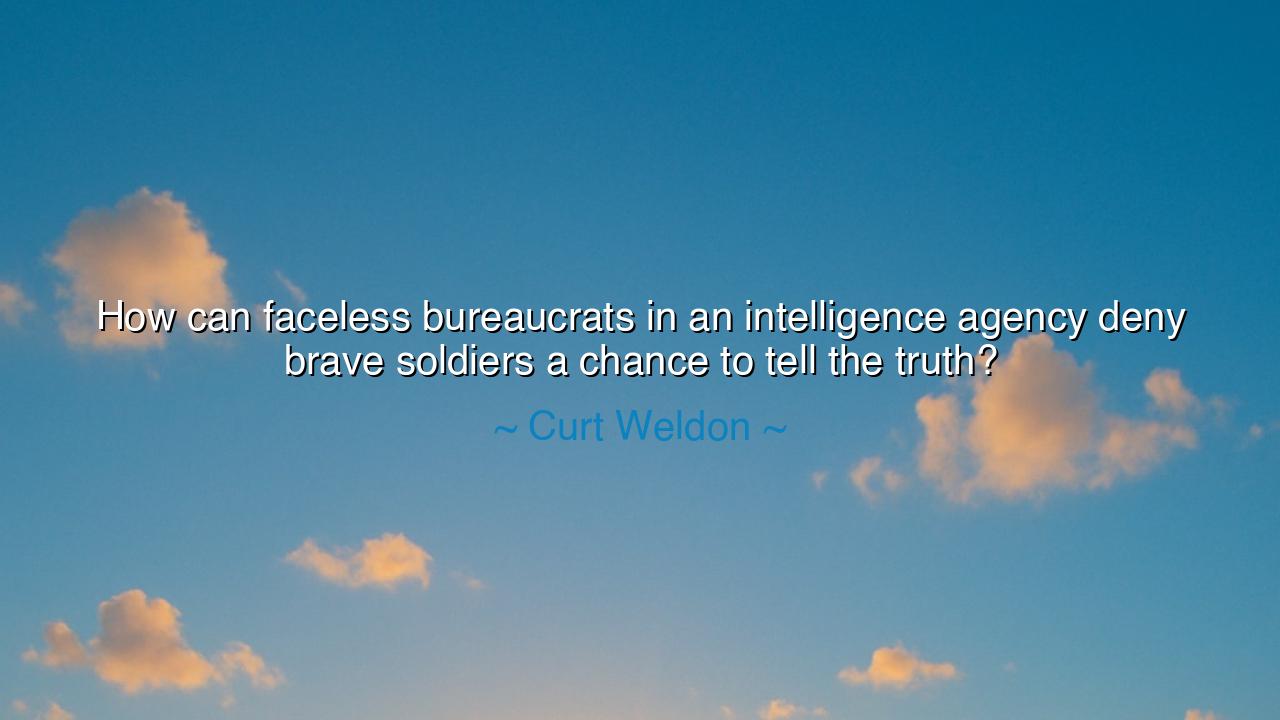
How can faceless bureaucrats in an intelligence agency deny brave
How can faceless bureaucrats in an intelligence agency deny brave soldiers a chance to tell the truth?






In this fiery and indignant cry, Curt Weldon, a former U.S. congressman known for his advocacy on behalf of soldiers and intelligence reform, asks: “How can faceless bureaucrats in an intelligence agency deny brave soldiers a chance to tell the truth?” Beneath these words lies not only political outrage, but a timeless moral question — one that echoes through the halls of history whenever power seeks to silence honor. His voice is not that of one man alone, but of all who have witnessed truth shackled by secrecy, and courage betrayed by convenience. For Weldon’s lament is as ancient as governance itself: when institutions grow cold and faceless, they forget the fire of the human spirit that built them.
The origin of this quote lies in Weldon’s confrontation with the machinery of government — particularly the intelligence community of his era — during the early years of the twenty-first century. He spoke these words while defending soldiers and intelligence officers who claimed to have vital information about threats facing the nation, yet were silenced by bureaucratic red tape and political agendas. His question was not rhetorical; it was an accusation and a plea. How, he demanded, could those who never face danger deny voice to those who risk their lives for truth? The faceless bureaucrat, in his metaphor, stands as the symbol of indifference — a shadow figure whose allegiance is not to justice, but to procedure; not to conscience, but to control.
Throughout human history, the same battle has repeated — the warrior of truth versus the guardian of power. In the age of emperors, it was the soldier who saw corruption in the court but was ordered to silence. In the age of republics, it was the whistleblower or the reformer, branded disloyal for speaking what the powerful wished hidden. The question Weldon raises is not about intelligence agencies alone, but about the eternal struggle between truth and authority, courage and conformity. His words remind us that the greatest danger to any nation is not the enemy beyond its borders, but the decay of integrity within its walls.
History gives us countless examples. Consider Smedley Butler, one of the most decorated U.S. Marines in history. After decades of service, he exposed what he saw as greed and corruption behind wars — revealing that soldiers often bleed for profit rather than for principle. For this act of honesty, he was dismissed as a radical. Or recall Galileo Galilei, who dared to speak a truth about the heavens that defied the dogma of his time. The faceless authorities of his day silenced him, but his truth endured long after their power crumbled. In each case, we see what Weldon’s question reveals: that truth-tellers are often punished not because they are wrong, but because they are inconvenient.
There is tragedy in this pattern, yet also hope. For every faceless bureaucrat who hides behind hierarchy, there are voices that will not be muted. Truth, though delayed, always finds its way into the light. The brave soldier, in Weldon’s imagery, is more than a man in uniform; he is every soul who stands for what is right against what is easy. His weapon is not his sword, but his testimony — his refusal to let silence be mistaken for consent. When such courage meets bureaucratic fear, the clash is inevitable. And yet, from such collisions, nations remember what they are meant to stand for.
The lesson, then, is clear: truth must never bow to protocol. Systems exist to serve humanity, not to smother it. A nation that silences its bravest voices weakens the very foundation of its freedom. Let no one be content to hide behind titles or ranks when injustice speaks in whispers. Bureaucracy, when devoid of conscience, becomes a machine that devours its own makers. And so Weldon’s question becomes not a complaint, but a commandment — a reminder that honor demands transparency, and that those who bear witness to truth must be defended, not destroyed.
So, my child, carry this wisdom forward: never let the faceless rule over the faithful. When you see truth silenced by fear, speak. When you see courage dismissed by comfort, act. For the fight for truth is not the work of the powerful, but of the steadfast — those who will not trade their conscience for approval, nor their integrity for ease. The soldier, the thinker, the dreamer — all must be guardians of honesty in their own realm. And though the bureaucrats may hide behind their walls of paper and protocol, remember always: the faceless may command for a season, but the truthful endure for eternity.






AAdministratorAdministrator
Welcome, honored guests. Please leave a comment, we will respond soon